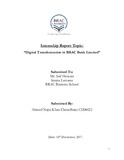Digital transformation in BRAC Bank Limited

View/
Date
2017-12-18Publisher
BRAC UniversityAuthor
Chowdhury, Ahmed Najin KhanMetadata
Show full item recordAbstract
In Bangladesh, BRAC Bank Limited is a private commercial bank which was founded on 4 July, 2001. Initially, the main purpose of this bank was to reach to the large number of unbanked people that was not covered by the traditional banks. Though the main motive of this bank was to facilitate Small and Medium Enterprises (SME), at present it is the provider of Retails Banking, Card Service (Credit & Debit), Wholesale Banking & Custodial Service, Probashi Banking, Foreign Exchange & Related Services, SME Banking and so on. They are giving their full effort to be the vibrant, transparent and efficient financial banking services provider in Bangladesh. BRAC Bank is ready to bring any change for the advancement of their consumer and to keep pace with the current dynamic market demand. Keeping this in mind, on the beginning of the next year-2018, they are going to introduce a new digital change in their company. This report has been made from that perspective to acknowledge the acceptability of digital transformation among the users in general, mostly in their employees. This was a qualitative research and both primary and secondary research are used to collect data so that the research can be done in an unbiased way. For the survey, 50 respondents are approached to express their opinion about digital transformation in a company. By using SPSS tools, researcher wanted to know the correlation of two specific questions from the survey questionnaire. In brief about the survey, most of the respondents support digital transformation. From their perspective, digital transformation incurs a huge amount of cost for that organization but compare to it’s usefulness-this cost is worth enough. Basically, digital transformation ensure the capabilities in it’s user to complete their task more efficiently so that they can embrace new challenges in this dynamic business era and can accomplish their business goals. Last but not the least, it needs to remember that, “Digital transformation is the profound transformation of business and organizational activities, processes, competencies and models to fully leverage the changes and opportunities of a mix of digital technologies and their accelerating impact across society in a strategic and prioritized way, with present and future shifts in mind” (i-scoop, 2016
